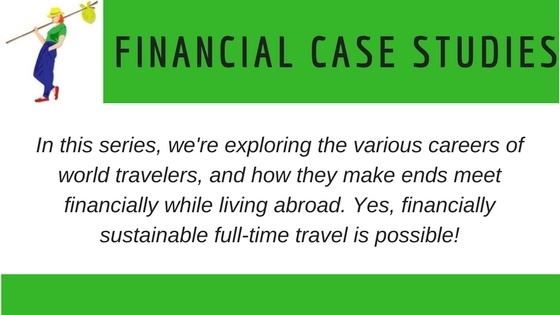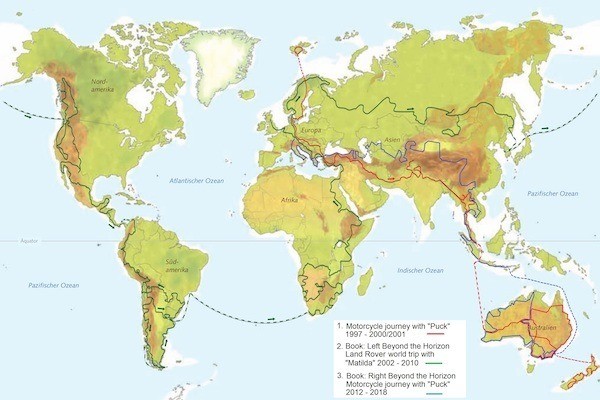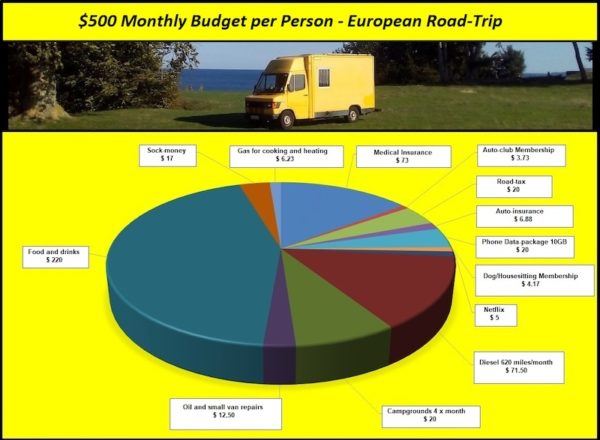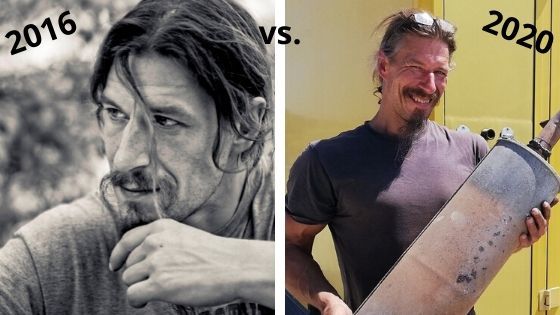Christopher Many (whose online home can be found here), born in New York City in 1970 to an American father and German mother, has always had a knack of breaking conventional norms and following his own dreams. More than anything else, he wanted to find out what lies “beyond the horizon”.
After completing an apprenticeship as a boat builder in Bavaria, Christopher lived modestly at various locations, alternatively working and backpacking through the Caribbean, Asia, Europe and Australia. In 1997 Christopher set off on his first motorbike world trip with Puck, his Yamaha Ténéré, and rode from Germany to New Zealand via India.
Three years later he returned to Europe, found a job in Scotland, and began to save up for his next venture: a round-the-world voyage with an ailing Land Rover he bought for only £700 (a little over $1,000). He named the Landy Matilda, and between 2002 and 2010 they journeyed together for 3,000 days through 100 countries. His book about this trip, Left Beyond the Horizon – A Land Rover Odyssey, became a bestseller in Germany, and was recently released in English.
In 2012, reunited with Puck (the motorcycle) and with his partner Laura Pattara, Christopher left Europe and headed towards Australia. Right Beyond the Horizon – A Motorcycle Odyssey tells the story of his four-year adventure on two wheels. After publishing the book, he spent 24 months in Australia, riding around the continent and criss-crossing the Outback.
After six years’ absence, Christopher Many briefly visited Germany in 2018…but only to buy an old, Decommissioned Mercedes 308D post-office truck and immediately to set off again. Currently Christopher and Laura are vagabonding through Europe with their bright yellow van.
Christopher has now been on the road for 23 years, and he’s still somewhere out there, doing what he loves most: travelling the world and writing books about his adventures.
This financial case study was originally published in 2016. I invited Christopher to update us on his situation, and how his lifestyle and income streams have evolved. Read on to discover how Christopher earns his living as an author and full-time traveller!

How long have you been living/working on the road, and where have you traveled to?
2016: I sold all my belongings, apart from what would fit into a rucksack, and opted out of conventional society to become a permanent nomad in 1997, when I was 27 years old. Since then, I’ve been continuously circumnavigating the globe, either with my Yamaha Ténéré motorcycle “Puck”, or my antiquated Land Rover “Matilda”. Both vehicles have carried me safely through Asia, Africa, Australia, both Americas, and Europe – together we’ve visited more than 100 countries.
2020 UPDATE: Isn’t it amazing how quickly time flies? When we last spoke, I was 46 … now I recently turned 50! And I really, really don’t like it one bit. Not at all. If I had a say in the matter, I would have stopped aging long ago. However, it’s not all doom and gloom. I’m still doing exactly the same thing I’ve been doing non-stop for the past 23 years: getting to know our little blue planet better.
And I must say: I love every minute of my over-landing life! Or at least the majority of minutes … occasionally it can get rough “out there”. I did change my mode of transportation last year, and swapped my motorcycle for an old Mercedes 308D post-office truck. It seemed better suited for a multi-year European road-trip. Where I’m sitting right now, the temperature outside has plummeted to way below freezing. I’m happy to be inside a heated van and not riding a bike. How many countries I’ve visited? I guess I’ve added another dozen or so since 2016, so the “grand total” is somewhere around 110.

Please describe what you do for income.
2016: I’m a published author. The income from my previous book “Left Beyond the Horizon – A Land Rover Odyssey” is fully sufficient to cover my travel expenses, purchase petrol, and fill my belly. On occasion, I can even afford a slice of cheesecake, which I consider vital to achieving a state of wellbeing. I’m not sponsored in any way by companies, and needn’t promote my trips by holding regular slide-show presentations or book-reading tours (thank heavens … I’m severely prone to stage fright), but instead, I can focus full-time on doing what I love most: traveling the world and writing about what I experience, without any distractions.
2020 UPDATE: Yes, I’m still a full-time author. Only now I have two books, “Left Beyond the Horizon – A Land Rover Odyssey” and “Right Beyond the Horizon – A Motorcycle Odyssey”. A third book is in the making, but it will take a few more years until my manuscript is finished. So far, my books have been published in English, German and Portuguese languages. For the visually impaired, a copy in Braille has also been released – an edition I’m particularly fond of. I strongly believe that everybody should be able to travel the world through literature. As you can see, my “business” has grown!
How many hours per week do you work on average?
2016: Work? I view writing more as a fervent passion than a job! Anyway … I guess every author develops their own routine, and what works for some, may not work for others. My routine? On average, I need about a week to research and write a 10-page chapter. So once every month, I try to find a comfy and inspiring setting where I can settle down for a few days, reflect upon the past weeks’ experiences, and put my thoughts to paper. Or – to be precise – into my laptop computer. My publisher would have a heart attack if I handed in a 400-page hand-written manuscript!
2020 UPDATE: I haven’t really changed my work routine at all. I still work on average one week per month on my books, followed by three weeks of exploring and collecting experiences. Of course, the writing is now infinitely more comfortable in our camper van. I have a real table, electric lights, a heater, solar-panels to recharge my laptop, a fridge and a coffee-kettle (I can’t write without coffee). This is pure luxury! For the past six years I’d been living in a tent with a sleeping-bag. Recharging my computer with my motorcycle-battery was sometimes difficult, and working with a headlamp inside a cold, wind-tossed tent wasn’t always ideal either.
How much money do you make?
2016: My income fluctuates, and depends solely upon the quantity of copies my publisher sells. I receive an annual royalty payment – always in the first week of January – and whatever I earn, will have to be enough to cover all my expenses until the following year. The basic calculation – as stipulated in my contract – is really very simple: my royalties are 8% of the net retail price per copy (most publishers pay between 6.5% and 10% royalties for non-fiction). So, as an example, my previous book “Left Beyond the Horizon” has a net price of USD $25. Of these $25 dollars, my publisher gets $23 dollars, and I get $2 … which explains why not many travel writers are mentioned on the “Forbes List of Wealthiest People on the Planet”. Still, one mustn’t forget that the publisher needs to cover the costs for editing, printing, distribution, marketing, and more … all I need to do is write. I’m not complaining: every time a reader buys a copy and I receive my $2, this allows me to fill my motorcycle’s tank with a gallon of fuel (and ride another 47 miles towards the horizon), or my belly with a big slice of cheesecake! Thank you, dear readers …
2020 UPDATE: Although my business has grown, my income hasn’t. I still only earn about USD $6,000 per year, on average. Maybe this will improve soon. I recently self-published my original English-language books with KDP Amazon. The royalties for Kindle eBooks are great: 70%. My previous publisher only paid 8% royalties!
However, being an author is not about earning “big bucks”, it’s about a passion for the written word. And I love the magic of words – how these strange, abstract blotches of black ink on a white sheet of paper, when assembled in a certain fashion, can conjure images in the mind and stir up cocktails of emotions. I want to tell my story, and the tales of those I had the great pleasure to meet en route. EVERYBODY on the planet has a story to tell, and worth telling. Just imagine the vastness of our combined experiences if each and every one of us wrote a book – printed and published, they would amount to a mind-boggling and wonderful collection! My Horizon books are my little personal contribution to this library.
Do you make enough money to support your lifestyle?
2016: Yes I make enough. I never knew that the Land Rover enthusiast, motorcycle fan-club and overlanding communities were this large! And no, I do not need to engage in any other work, at least not in return for payment. Sometimes I might help out here and there for a few months, but purely for the enjoyment of “fun” jobs. I never accept money – give me a bottle of wine, some food and good company – that’s all I ask.
I’m fortunate, I presume … not every author sells enough books to finance his lifestyle. But I also live modestly on the road, travel less than 1,000 miles per month on average, cook my own meals, and camp usually “wild” in the bush for free. This way I can keep my travel budget to under USD $6,000 per year, which – in other words – necessitates the sale of only 3,000 books p.a. Should I sell more, and have money left over, then I deposit the excess into my savings account, splash out on a new set of tyres, or go perhaps scuba-diving with my partner Laura. Should the book-market crash and I sell less, well, it’s not the end of the world. I’d then travel slower, cover shorter distances per month, spend less time in costly countries, and if need be, even forgo my cherished monthly bottle of wine. Where there’s a will, there’s always a way.
2020 UPDATE: Even though I’m now travelling in Europe with a van, and not with a motorcycle through Asia, USD $6,000/year is enough to keep me on the road. Van-life is inexpensive, if you live modestly and avoid costly campsites. I was pleased to discover that USD $500/month per person is sufficient to live a nomadic life on this continent … as long as I can stop my partner Laura from buying yet ANOTHER pair of shoes. She really is relishing the extra storage space in our van. On our bikes, she owned only one pair of motorcycle boots. My girl deserves better!
What is your vision for the future of your lifestyle on the road?
2016: I love the simplicity of my nomadic lifestyle: I sleep when I am tired, eat when I am hungry, and shovel my Land Rover or motorcycle out of a Kalahari sand dune when I get stuck. And I write books some people will hopefully enjoy. That basically sums it up! I probably have far fewer problems than your average home owner with a nine-to-five job and a family to feed – my life and the past 19 years on the road have been comparatively easy. So if you were to ask me, if I can imagine traveling for another two decades, my answer would be “yes, definitely”. However, it is not my habit to think that far ahead. Laura and I tend to plan our days only one hour at a time – who knows where we’re going to put up our tent tonight, what we’ll find to eat and who we’re going to meet? And I believe that it’s precisely this unpredictability – the fact that the future is never foreseeable – is what makes life so incredibly exciting!
2020 UPDATE: My voyages will continue. I have so many travel-related dreams, I couldn’t realise a fraction of them in the next 100 years. I want to follow in the footsteps of Stanley through Africa to the source of the Nile, cross the Sahara on the classic RN1 in Algeria, circumnavigate the Mediterranean on a motorbike, and climb the loftiest peak in every European country. Perhaps I could sail the seven seas in a rickety boat or build a log cabin deep in the Canadian wilderness? At the age of 12, my room’s walls were already plastered with maps and my shelves were lined with adventure books. So maybe it was all the “fault” of Jack London and Bruce Chatwin that I can’t settle down? Beware of travel writers!
Any advice for the aspiring traveler about living and working on the road and managing finances?
2016: The best advice I can give you, if you have a meagre annual income, is to travel slowly … especially if you are an overlander with a vehicle. I probably couldn’t live on USD $6,000 per year if I traveled any faster. Why? Well, remember that the combined costs for fuel, visas, shipping and flights can easily amount to HALF of your trip’s budget. Irrespective whether you conclude your voyage in a year or ten, the grand total of these expenses remains the same.
But what you can influence is your average expenditure per year. For example: an overlander who rides his motorcycle from Europe to Australia might cover 30,000 miles, including a few detours. If his bike’s consumption is 40mpg, and the average fuel price is four dollars per gallon, he’ll need to budget $3,000 for fuel alone. Let’s assume he obtains all the permits to cross China for $2,000, spends $500 on visas for the two-dozen countries on his route, and the shipment of his bike (including his own airfare) from Indonesia to Darwin costs another $1,000. That’s $6,500 all up … a hefty sum for a one-year journey!
However, if the overlander takes things slowly, and covers the distance over four years (like I am currently doing), his average annual expenditure drops to a reasonable $1,625. On top of that he’ll only need to cover the costs for food, accommodation and insurances, which are proportionate to his trip’s duration. In the end, a four year motorcycle trip is only twice as expensive as a one year journey, NOT four times! If you now subtract $1,625 from $6,000 and divide the remainder by 365, this leaves me with almost $12 per day for food and accommodation … which is more than enough. On my Land Rover journey, by the way, the situation was much the same. Whereas my Landy’s fuel consumption was higher, the trip lasted eight years instead of only four. Hence, my average annual expenditure was nearly identical.
2020 UPDATE: Below is a detailed 13-point breakdown of all our monthly van costs in Europe, together with a pie-chart. Some of our expenses are “fixed”, meaning they cannot be influenced (such as road-tax, vehicle insurance, medical insurance, and a few membership fees). Other costs are variable, and depend upon our desires and needs (such as fuel, repairs, food bills, Laura’s shoes, and how often we decide to sleep at a campsite instead of in the bush for free). For example: if we need to buy a new set of windshield-wipers, then we’ll use some of our food-, fuel-, or campground-money to cover the unexpected expense, and adjust our travels accordingly. “Sock-money”, by the way, is precisely that: spare change left over from the monthly $500, and I deposit into my “sock-bank-account”. Maybe I’ll use it one day to buy a new black t-shirt … or another pair of socks.
(See also: Nora’s annual financial reports, detailing her expenses and income)

Fixed costs per month, per person: $132.77. These include:
- Expat medical insurance: $ 73.00
- Automobile club membership: $ 3.73
- Road tax: $20.00
- Auto insurance: $6.88
- Phone data package 10GB/month: $20.00
- Dog/house-sitting membership: $4.17
- Netflix: $5.00 (watching a movie at night can also be nice!)
Variable costs per month, per person: $367.23. These include:
- Diesel for 620 miles per month (21mpg): $71.50
- Campgrounds/4 nights per month: $40.00
- Oil and small van repairs: $12.50
- Gas for cooking/heating: $6.23
- Food and drinks: $220.00 ($7.33 per person, per day)
- Sock-money: $17.00
Check out Christopher Many’s website for the latest updates on his whereabouts and activities.



I could live on $12 a day easily enough, but it would have to be just for food. My accommodation expenses per day would add a further $13. To receive a single payment of $6000 per year, and budget it so precisely, takes strength of character. I think a lot of people would find it hard to remain so focused on their budget and make it work.
Hey Steve,
Tell me about it! I’m impressed. But I’ll bet it has also taken Christopher a while to hone his perfect travel style – and cost. It helps that he’s pretty self-sufficient on the bike, with a tent and all.
Hi Nora,
I think he’s got his head screwed on straight as far as the maths goes as well. He appears to make a sound plan and stick to it. Living in a tent is not an option for most people who have location independent incomes because the internet is a necessary part of their lives, but Chris’ income does not appear to necessitate it, so he has an advantage most of us do not have.
I agree, Steve! I get palpitations when the internet signal wanes. 😉 I once spent a month in the jungles of Peru without internet, and it was a major undertaking!
Christopher is a great example of how we can design our careers around our lifestyle ambitions (rather than the other way around).
I ordered the book immediately after reading this, but there was an online special for $1.64. Sorry, Chris, you didn’t get $2.00. The book is great, I’m about to follow him into Sudan.
Still a fan after discovering Christopher in the original column and reading both books.
That’s awesome, Amit!